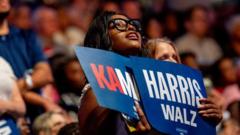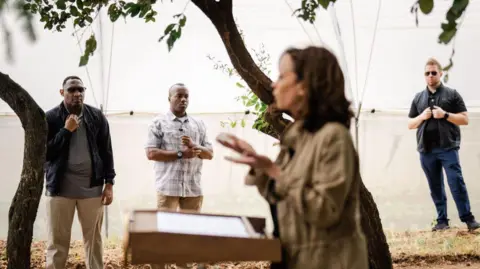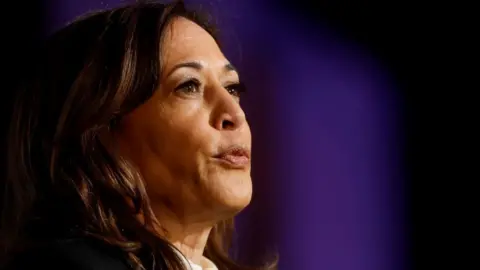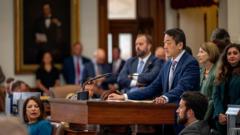On an unusually warm fall morning at the University of Michigan's Ann Arbor campus, excitement buzzed as dozens of students lined up at the early voting center. Many, like third-year student Keely Ganong, expressed their support for Kamala Harris, viewing her as a beacon of leadership in a challenging political landscape. "She’s just a leader that I would love to look up to to represent my country," Ganong shared, highlighting concerns over gender equality. Her friend, Lola Nordlinger, emphasized the crucial nature of reproductive rights, stating, “A woman’s choice is something that’s so personal to her, and it really should be no one else’s decision.”
The momentum among young women voters is significant, as Adrianna Pete, 24, noted, “I feel like a lot of women are rising up.” Such sentiments reflect a broader trend, with recent surveys indicating Harris leading among women aged 18 to 29 by a staggering 30 points. Her appeal extends to college students of all genders, where she enjoys a 38-point advantage.
Hannah Brocks, who recently attended a packed Harris rally, has actively engaged in campaign efforts through her university's young Democrats club, applying personal outreach to rally support for Harris. "I just like the way she talks about people in general... It’s just so much love and empathy in how she communicates," Brocks stated.
As the national race tightens in key states, including Michigan, Harris's campaign is relying on this swell of young female voters to generate significant turnout. Events from prior elections serve as a reminder of the formidable impact young women can have, having outvoted men by about 10 million in 2020, according to the Center for American Women in Politics.
However, age demographics reveal a complex voting landscape. While Harris's support among young women is strong, the same polls indicate she maintains a narrower margin with some demographics, most notably white women. This is noteworthy, as historical voting patterns have shown a tilt toward Republican candidates, a trend that Harris's campaign will strive to counteract.
Pollster Evan Roth Smith emphasized the crucial subset of voters Harris aims to engage: “The best avatar for a voter writ large is a woman in a swing state who didn’t go to college,” pointing out their underlying concerns towards immigration and economic policies while suggesting that abortion rights remain pivotal for swaying their votes.
In battleground Arizona, the stakes loom larger with a ballot measure that could define abortion rights in the state following the overturning of Roe v. Wade. Women like Mary Jelkovsky see this as an opportunity to galvanize support, invoking personal experiences to amplify discussions around reproductive rights.
On the campaign trail, some Republican women are expressing their discontent with the party's stances, including lifelong Republican Rebecca Gau. After voting for Biden in 2020 as a protest, Gau is now excited to vote for Harris, believing she represents practical American women tired of "toxic masculinity." Conversely, not all women are swayed; some, like Texan Tracey Sorrel, remain loyal to Trump, prioritizing policy over personal appeal.
As the narrative of woman versus man continues to shape political discourse, the reality is far more intricate. Harris's campaign focuses on unifying diverse demographics and addressing shared concerns, particularly around women's rights, to secure an edge in the closely contested election ahead.



















